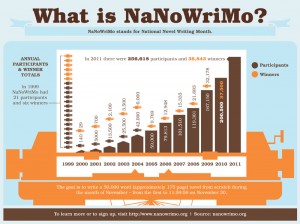 November is National Novel Writing Month, NaNoWriMo for short… here are ten select online tools to help you toward your 50,000 word goal! (Click on the graphic to enlarge) This post includes selected links from a post by Online PhD Programs. Visit them for all 25 tools:
November is National Novel Writing Month, NaNoWriMo for short… here are ten select online tools to help you toward your 50,000 word goal! (Click on the graphic to enlarge) This post includes selected links from a post by Online PhD Programs. Visit them for all 25 tools:
-
National Novel Writing Month:
Before deciding to attempt the NaNoWriMo challenge, it’s advisable to keep the official site bookmarked not only for quick access to all the rules, but tips and networking with fellow participants as well. The page also makes it easy for participants to track their daily writing progress and set goals for themselves…
-
Rescue – or Beef Up – Your Beat Sheet:
Larry Brooks specifically targets NaNoWriMo enthusiasts with a blog post listing some of the best online tools for crafting the most effective beat sheets. While the mapping process isn’t a requirement, it undeniably helps expedite and organize everything so writers can transition from notes to novels quicker.
-
Scrivener:
For 2012, this wildly popular Windows and Mac app is offering NaNoWriMo participants a 50% discount if they hit 50,000 words — until then, they are encouraged to take advantage of the 30-day free trial for the whole month of November. Scrivener offers up a “complete writing studio” where authors can gather notes, map out their stories, and anything else they need to organize a project.
-
Fiction Writer’s Toolbox:
Rather than one particular resource, this handy dandy blog posts relevant news and reviews all about the tech authors need to streamline their writing careers. Consider it a tool for finding tools, not unlike eHarmony.
-
Scribophile:
Scribophile actually partners with NaNoWriMo, encouraging aspirant and established authors to come participate in their top-ranked forums and critiques. Not only that, but they receive detailed information about how to succeed in the publishing business after a right fair amount of trying.
-
Critique Circle:
As an alternative to — or in addition to — Scribophile, Critique Circle also stands as one of the most respected online writer’s forums around. Join up when looking for advice about the storytelling process and upload works for others to dissect and offer up suggestions.
-
Archetype:
Learn all about how to get psychology right when depicting fictional characters, even ask questions of professionals so as to avoid harmful stereotypes and misinformation. Plus, the amazing Archetype site also hosts idea generators to push authors out of their inspirational slumps.
-
Reference.com:
It has mad dictionary, reference, and translation skills that writers need to whip their novels into sweet submission. And, when things start dragging a little bit, there’s always word games to help chip away at the boredom — maybe even inspire some sexily witty sentences.
-
The Imagination Prompt Generator:
When stuck on a concept, consult The Imagination Prompt Generator for random suggestions that may very well serve as the jumper cables your novel needs. Just keep hitting the button if the results you get just do not satisfy. Kinda like what you do with your Magic 8-Ball.
-
Grammar Girl:
Mignon Fogarty’s oft-ballyhooed podcast and blog cover grammar issues major and minor, making it an absolutely essential reference for writers. No matter the issue, chances are she has already covered it at some point; a recent episode even covers NaNoWriMo and interviews its current executive director!
On Friday, watch for a preview of our newest team member and WWW service: Video Book Trailers!
